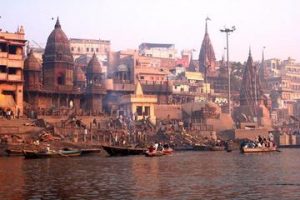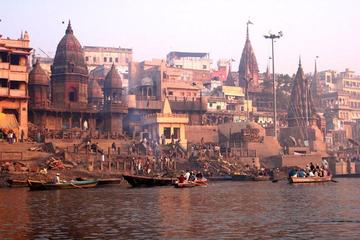 Janjivan Bureau / New Delhi : Prime Minister Narendra Modi’s parliamentary constituency Varanasi will soon get two sewage treatment plants as part of the government’s bid to curb Ganga water pollution, an official statement said here today.
Janjivan Bureau / New Delhi : Prime Minister Narendra Modi’s parliamentary constituency Varanasi will soon get two sewage treatment plants as part of the government’s bid to curb Ganga water pollution, an official statement said here today.
The sewage treatment plants, having a total 260 million litres daily capacity, will be commissioned at Varanasi’s Dinapur and Goitha before March next year, the statement said.
The government had recently awarded contract for constructing 50 MLD (million litres daily) capacity STP (sewage treatment plants) at Ramana in Varanasi.
The three STPs concerned and as many existing, will together create a total sewage treatment capacity of 412 MLD, the water resources ministry said in the statement. The STPs, when completed, will meet the sewage treatment needs of the city till 2035.
“A 140 MLD STP at Dinapur and a 120 MLD STP at Goitha are being constructed under Japan International co-operation Agency-assisted project and JNNURM scheme respectively. These projects are at an advanced stage and will be commissioned before March 2018,” the statement said.
The work on interceptor sewers for rivers Varuna and Assi; development of three pumping stations at Chauka ghat, Phulwaria and Saraiya; rehabilitation of old trunk sewers and rehabilitation of ghat pumping stations and existing STPs is also underway to improve the entire sewage infrastructure in the city, the statement added.
“To address the concerns of floating waste on the river, a trash skimmer is operational in Varanasi since April 2017 under river surface cleaning component,” the statement said.
It also claimed that the government’s efforts to ensure that 84 of the city’s heritage ghats become cleaner have shown “positive” results under the Namami Gange initiative. In addition to this, the authorities have undertaken ghat improvement works at 26 locations.
Besides, construction of 109 of the total 153 community toilets — contracts of which have been awarded — has already been completed, the ministry said. These toilets are being used by 15,000 to 20,000 people every day, it added.
“In a bid to arrest the pollution from cloth washing activities on ghats, four dhobi ghats – Pandeypur, Nadesar, Bhavania Pokhran and Konia – have already been renovated. The construction of three others at Bazardiha, Machodari slaughter house and Bhawania Pokhri (extension) is underway,” the statement said.
Several members of the dhobi community have shifted to the new ghats, with many more being pursued for the same, it added.

















